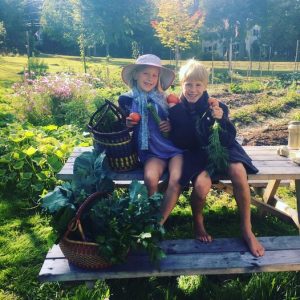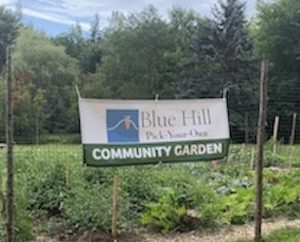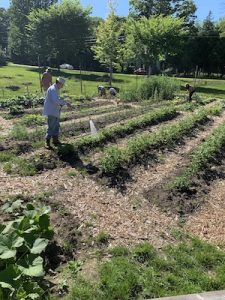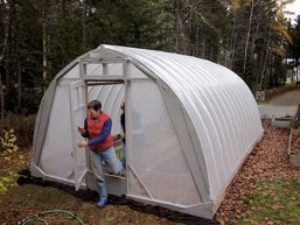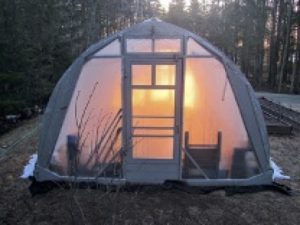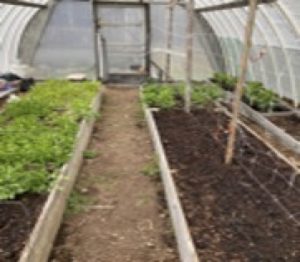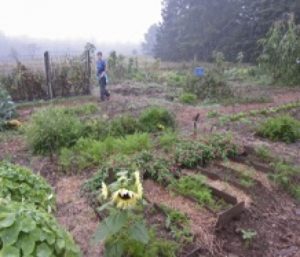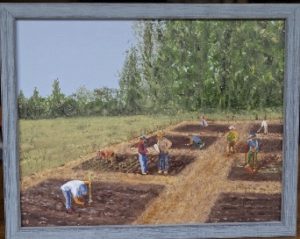Hancock and Washington County Master Gardener Volunteers News – August 2021
TABLE OF CONTENTS
Class of 2021 |Mainely Dish YouTube Recipes | Spoonful ~ New! | Monthly Project Highlight | MGV Pofile | Click It Before You Pick It| Reporting Hours
UPCOMING DATES TO REMEMBER
Sept 2-6 Blue Hill Fair
Sept 7 MGV Advisory Committee Meeting – ZOOM
Sept 8 Fall Semester for MGV Training ResumesPreview Changes (opens in a new tab)
Sept 24-26 Common Ground Fair
COVID Protocols
We will keep you updated on any future Covid Safety protocol changes. Watch your emails. Thank you all for being so patient and cooperative!
Class of 2021 News
The 2021 MGV class participants are now immersing themselves in their volunteer projects around the county! They will be coming back together in September to complete the fall portion of their training.
Mainely Dish Recipe Videos

To some “Kale” is a four-letter word but when you have dressed up like this you might change your mind!
Visit our Expanded Food and Nutrition Program (EFNEP) YouTube site for a listing of other YouTube recipes to try!
Spoonful! ~ New!!
Topics Include: Get Ready for Canning Season, Extra Eggs? Pickle them!, Blueberry Cobbler, and more!
MGV Project Highlight ~ Hancock and Washington County
Each monthly newsletter will highlight a MGV Project. For May we are pleased to introduce:
Blue Hill Community Gardens
- BHCG Summer Harvest Kids
In the summer of 2020, the Blue Hill Garden Club transformed a 2,400 square foot plot of unused land at George Stevens Academy into the Blue Hill Community Garden: a free pick-your-own garden welcome to all people. In the garden’s inaugural year, an estimated 600 pounds of food was picked by visiting community members as well as volunteers who deliver crops to local food security organizations.
The Blue Hill Community Garden shares the vision modeled by the Incredible Edible Network– “to create kind, confident, and connected communities through the power of food”. This project aims to reduce barriers to healthy food by providing free produce and garden-based education to all community members, and to increase opportunities for gathering and socializing around food and gardening. Project members host free educational programs in the garden, and partnerships with local schools facilitate pathways for classroom integration. Colorful signage is located throughout the garden to inform visitors of the various crop types available for picking, as well as information on how to save seeds.
Over 60 varieties of vegetables, herbs, flowers, and native perennials are grown by volunteers and students using natural gardening practices, ensuring that the soil and the ecosystem that surrounds it are positively impacted by the garden’s activities. Some of these methods include cover cropping, mulching (with plant materials like seaweed and straw), composting, intercropping, crop rotation, and hand-picking garden pests.
This summer the Garden Club installed two raised vegetable beds to increase the accessibility of fresh produce for people living with mobility limitations. By the end of the summer an informational kiosk will be installed at the garden’s entrance to educate visitors, pickers, and volunteers.
This project would not be possible without the generous support of dedicated community volunteers, many of which come to the project through the Blue Hill Garden Club and the Master Gardener Volunteer Program. Over 620 hours of volunteer time was donated to the project in 2020. The community garden is supported by New England Grassroots Environment Fund, SeedMoney, Maine Farmland Trust, and private donors.
To learn more, contact MGV Rachel Emus at rachel.emus@gmail.com.
Master Gardener Volunteer Profile
Lesley Straley
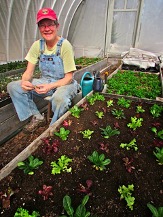 MGV Lesley Straley (Class of 2012) has been with the Hancock Community Garden (HCG) since she did her MGV training, and is currently a coordinator. One of the things she loves about the HCG is the hardworking gardening team. “We become real friends, laugh a lot, and support each other through hard times in our personal lives.” The project has approximately 2000 sq. ft. of space. “It’s a joy to raise so much local, nutritious food. We distribute it though local agencies – mostly the soup kitchens, Loaves and Fishes Food Pantry, and Emmaus.” Lesley also has a leadership position in the larger, individually-worked plots at the Community Garden, and enjoys working with community members who aren’t MGVs. “Raising food is such genuine work, so basic and direct. I love being in a community that values that.”
MGV Lesley Straley (Class of 2012) has been with the Hancock Community Garden (HCG) since she did her MGV training, and is currently a coordinator. One of the things she loves about the HCG is the hardworking gardening team. “We become real friends, laugh a lot, and support each other through hard times in our personal lives.” The project has approximately 2000 sq. ft. of space. “It’s a joy to raise so much local, nutritious food. We distribute it though local agencies – mostly the soup kitchens, Loaves and Fishes Food Pantry, and Emmaus.” Lesley also has a leadership position in the larger, individually-worked plots at the Community Garden, and enjoys working with community members who aren’t MGVs. “Raising food is such genuine work, so basic and direct. I love being in a community that values that.”
Loving to eat and wanting to consume more local and organic vegetables, Lesley chafed at the expense of locally grown produce. She laughs, “Then it turns out I spend just as much trying to grow my own!” But she continues because it’s fun and rewarding. “Also, I like building things.” Examples include the hoop house she built for herself to grow food year-round, the “root box” she designed and uses in her garage for storage of veggies in the winter, and her efforts to install fences for her crops. “Growing on trellises saves space and keeps things off the ground away from rot and pests.”
- Sunrise filtering through the greenhouse
- Spring Gardening
- Snow cascades off Greenhouse in the winter
With a goal of trying to grow all the vegetables wanted at home that could be grown in Maine, Lesley relied on Eliot Coleman’s book, Four-Season Harvest. It inspired her to research hoop house designs, then to design and build her own. She used lumber salvaged from construction sites to construct her 20’ x 12’ hoop house. She takes the plastic off from May to September, both to benefit from rainfall and to head off potential problems with excess salts in the soil due to excessive dependence on irrigation. Winter greens of arugula, spinach, mache, and claytonia are mainstays in their salads when lettuce is no longer available. She raises kale and various Asian greens for cooking. The veggies are grown in the fall while the light is still strong; the hoop house becomes a “living refrigerator” in winter. Sunny daytime temps reach 60º; the ground never freezes deeply. Inside the hoop house at night temperatures will get down to just about the same as it is outside, so the winter veggies are very hardy. The wind protection and daytime high temperatures offered by the structure get her crops through the 3 toughest growing months up here; by mid-February the growing season takes off again.
As her house does not have a basement, for winter storage of vegetables Lesley built, in her garage, an insulated cabinet, about 6’ x 6’ x 14”. For a thermostat she uses a “Watchman,” sold for absent homeowners to use to alert neighbors or caretakers to an unacceptably low temperature in their homes. This inexpensive unit has a temperature gauge set to turn on the juice to an electric line if the temps fall lower than a preset level. When the root box gets too cold, two incandescent lights turn on and reheat the box. (Two bulbs reduce the potential for a freezing disaster if a bulb should fail.) The lights go off when the box warms up. Her root box veggies are packed in sawdust to help keep them at the right humidity.
- Lesley at Hancock Community Gardens – Setting up trellis for Tomatoes
- Painting of Hancock Community Gardens by MGV Doug Gray
“I love being outside doing what feels like productive work. Gardening is a way to be connect with the natural world, to join in the ancient human tradition of agriculture, and to work with a community of people. It’s a miracle, really, what happens when you plant a seed. Nurturing a productive plant and plot of earth is a source of wonder and delight.”
Lesley Straley – Master Gardener Volunteer
Click It Before You Pick It!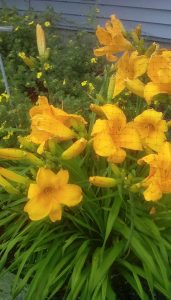
PLEASE snap photos of the plants you will donate to the 2022 MGV plant sale. As certainly as a single plant multiplies this summer, gardeners can divide them in the spring. This day lily is sure to equal 3 plants for the sale plus one to remain in place with space to continue multiplying. Gardening math is an exponential experience!
Note that this lily is one that MGV’s Tom and Brooks Engle donated to our 2017 sale. The sturdy stems stand tall as if on steroids and are loaded with blossoms as large as fat cigars. Blossoms are the size of my open hand, and recently there have been about a dozen a day to deadhead. (Bird netting deters deer from eating the buds.)
Did you know? 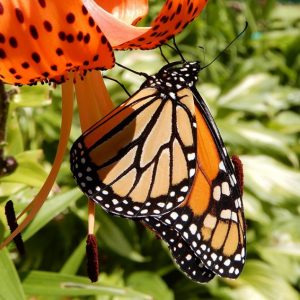 Our On-line Publications site has a whole new look!
Our On-line Publications site has a whole new look!
University of Maine Cooperative Extension’s publications and books help “extend” University of Maine resources to the Maine public:
VISIT ONLINE HERE!
Please be reminded to REPORT your Master Gardener volunteer Hours monthly
July Hours are due NOW – REPORT HERE

